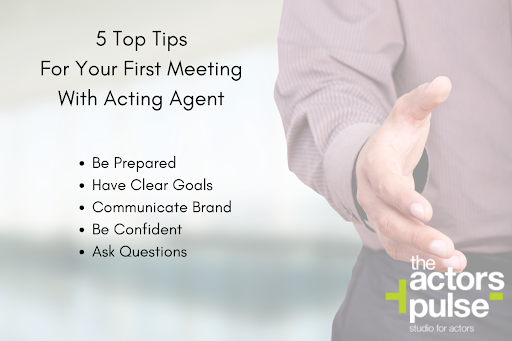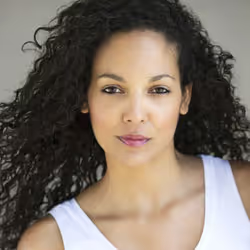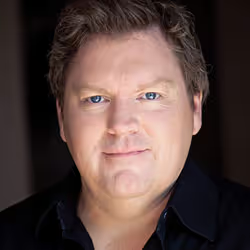How To Prepare For Your First Meeting With An Acting Agent

So you’ve done your legwork and sought out your ideal agency to represent you as an actor. They’ve responded to your request and now you need to meet in person. How do you ensure you impress them at this first meeting?
Just like a job interview, your first meeting with your acting agent should be well prepared and well thought out. To help you make a winning first impression, here are our top tips.
But They Called Me…
Before we dive right in, let’s just touch on this. We get it, if an agent has called you based on your submission that included your showreel, CV, headshots, etc, it can feel like there’s not a whole lot else to say.
If they have called you to meet based on your submission, isn’t it a sure thing to get signed? Not always. Agents want to get a sense of who you are in person, your charisma and your vibe. This is why you should always treat these meetings with respect.
The agent needs to be convinced that you are worth representing and will reflect well on them when they put you forward for roles. So yes, be confident, but not cocky or too self assured that you will be signed as a result from this meeting.
Top Tips For Your First Meeting
1. Be Prepared
Often an agent will request you to perform a monologue during this first meeting. You’ll need to make sure you have one prepared and that you have practised it repeatedly. You need to be able to capture the agent’s imagination through a compelling performance.
Be sure to dress in a way that complements your performance and is not distracting. As an interesting aside, actors that wear blue are statistically more likely to be signed or cast in a role.
2. Ensure Your Goals Are Clear
One of the keys to a successful agent/actor relationship is ensuring that they are supportive of your goals.
If your goal is to work on screen and you have zero intention of pursuing theatre, you need to be clear about this. If you are bi-lingual but prefer only to work in English speaking roles, you should outline this too.
Ultimately, you want an agent who is going to seek out and put you forward for roles you actually want. Otherwise, it is a waste of your time and theirs.

3. Communicate Your Brand
As well as your goals, you should be sure to spend some time thinking about your brand. Are you a dramatic actor or a comedic actor? What are your strengths?
Knowing your strengths and talents means you are best positioned to discuss them and promote them.
It can also be helpful to understand your weaknesses and be open with these to your agent. They can guide you in how to work on certain areas and select more appropriate roles based on your strengths and skills.
4. Practice Confidence
The agent has confirmed your talent from your submission and likes what they see, otherwise they wouldn’t have set up the meeting in the first place. Now is the time to further impress them through confident communication and body language.
We know it can be nerve wracking, but try to remember to smile, sit up straight, make eye contact, and speak clearly. This is your time to shine. You may like to practise ahead of time with a friend or family member.
5. Ask Questions
Questions not only help you better understand if the agent is right for you, but they also provide insight into your motivations for the agent. This is a two way job interview at its heart and questions help both sides make informed decisions moving forward.
You should think about the types of questions you might like to ask including but not limited to:
- How will they contact you about auditions?
- What percentage of commission do they take?
- Who will be your point of contact?
- Why are they interested in representing you?
- What is their experience level?
- Who do they currently represent that is doing well?
6. Get Excited!
While it is so important to be prepared, you shouldn’t lose sight of the fun and excitement this opportunity represents. The agent did call you, after all, so you know they already like you, the first big hurdle is over.
The more relaxed you are and happy you appear about the meeting, the more likely it is to go well.

Should I Sign At My First Meeting?
Ideally, you shouldn’t sign or agree to anything at this first meeting. No matter how well it goes, it is preferable to tell the agent that you enjoyed meeting them but would like to sleep on it.
It’s absolutely fine to say you are keen but also that you would like to call them in a couple of days with an answer.
If an agency exerts undue pressure on you or decides they no longer want you a day or two later after you’ve had a chance to think about it all, they weren’t for you.
Choosing to sign with an agency is a big step for an actor and you do not want to make any rash decisions. Great agents understand and respect your request to consider their offer and many will expect you’re going to be meeting with other agencies and comparing offers too.

This partnership could be the start of a huge leap in your career as an actor, so take your time and make sure you are entirely comfortable with the arrangement.
Should I Try To Negotiate Conditions And Fees?
If you feel comfortable, you can try to negotiate fees and conditions during this meeting, but we recommend doing your research into what is considered ‘normal’ for your area first.
An agent is not going to want to lose out financially for signing you when they haven’t really had an opportunity to see how well you’ll do. Pushing too hard too soon, could see them back off and elect not to work with you.
Fees are usually in the vicinity of 10%, however, this can vary between agencies and countries. Be sure to familiarise yourself with what percentage is common in your area and never agree to pay an agent up-front fees or annual charges.
Likewise, contract terms regarding duration or whether you are permitted to pursue auditions independently should be reviewed carefully. Most contracts are only a year long and agencies will handle auditioning and departure differently.
Be sure to advocate for what you are comfortable with while also being fair to the agency which is going to be working hard to promote you.
Does Signing On Mean I’m All Set?
When preparing for this first meeting, it’s tempting to think that if you can get signed, you’ll be hurtling towards more roles and success without delay.
However, signing with an agent does not guarantee that you’ll soon be swimming in auditions and regular paid work. It does mean you’re locked into a representation with them until the contract ends.
This is again why we encourage you to be prepared and ask lots of questions. You need to understand exactly what is expected of you and what they’ll do for you and your career as an actor.
Get excited, but keep a level head as much as possible.
What If I Don’t Get Signed?
If an agency elects not to sign you following your meeting, it can be incredibly disheartening. Just like auditions though, this doesn’t mean you aren’t destined to be an actor, just that this agent wasn’t the right fit for you.
It is much better that an agent decline to sign you if they have misgivings, than signing you and then failing to support you as you deserve.
You may like to ask why they did not sign you, it could be as simple as they do not feel best positioned to represent your demographic. If they give you more personal feedback, treat it as constructive criticism and try not to take it to heart, but use it to fine tune your approach in future.
Where To Find Additional Support
One of the best ways to prepare for your agency meeting is to speak with experienced actors and mentors who have been through this process themselves.
Attending acting lessons exposes you to a network of talented individuals who can give you advice about how to best manage and prepare for your meeting. It also allows you to work on your strengths and weaknesses as well as prepare a compelling monologue.
At The Actors Pulse, our teachers are exceptionally experienced and committed to helping you achieve your career goals.
From targeted classes to support preparing for auditions and meetings with agencies, we have the skill and inside knowledge you need to grow as an actor.
Connect with industry experts and be taught and mentored by the Southern Hemispheres’ leading experts in the Meisner Technique. We’ll help you hone your skills and prepare you to excel in your first meeting with an agent.
To learn more, speak with the team at The Actors Pulse acting school in Sydney today at 0414 475 515.
Start today!









Contact Us
Get in touch with us using the form or details below. We look forward to hearing from you!









